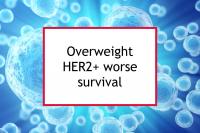Generally speaking, obesity increases risk of breast cancer and worsens prognosis. However, several factors influence its effect on prognosis, including timing of obesity, degree of overweight, and breast cancer type. Now a new study has reported that HER2+ patients who are initially overweight or obese (i.e., BMI ≥25 kg/m2) have worse outcomes than leaner women.
Obesity appears to contribute to worse outcomes primarily through factors associated with excess weight, such as higher blood insulin, glucose and estrogen levels, and systemic inflammation. There is also evidence that fat tissue itself can promote cancer directly by generating a favorable environment for tumor growth, for example, by secreting growth factors such as leptin.
Leptin has been reported to promote breast cancer cell growth and impair response to trastuzumab (Herceptin), which is used to treat HER2+ disease. One study reported that overweight or obese women with ER+/PR+/HER2+ disease were less likely to achieve pathologic complete response after neoadjuvant treatment. Another study reported that among relapsed HER2+ patients, overall survival and time to progression decreased with increasing BMI: the median overall survival for normal weight patients was 40 months, whereas it was 36.5 months for overweight (BMI of at least 25 up to 30) and 31 months for obese (BMI ≥ 30) patients.
Latest research finds worse HER2+ survival for overweight women
The exploratory study referenced above was designed to investigate the links between BMI (and two-year weight changes) and survival in patients with HER2+ early breast cancer. To conduct the study, the authors analyzed data from the APHINITY trial, a randomized trial conducted in 549 centers across 42 countries. BMI was assessed at intake and two years after randomization. Participants were categorized as either underweight/normal weight (BMI < 25) or overweight/obese (BMI ≥ 25). The study included 4,787 patients, of whom 2,535 (53%) were underweight/normal weight and 2,252 (47%) were overweight/obese. The associations of BMI with invasive disease-free survival, distant recurrence-free interval, and overall survival in those with HER2+ disease were calculated.
Participants who were overweight/obese were found to have at least 25% worse invasive disease-free survival, distant recurrence-free interval and overall survival than underweight/normal weight participants. Overweight/obese patients experienced more frequent chemotherapy discontinuation than underweight/normal weight participants (14% compared to 9%). However, the effect of being overweight or obese on invasive disease-free survival remained after adjusting for chemotherapy discontinuation. Weight change at two years was not significantly associated with survival outcomes. The authors conclude that being overweight or obese at diagnosis was associated with worse survival outcomes in the study population.
Please see our articles on HER2+ diet and obesity for more information.
